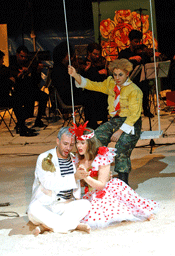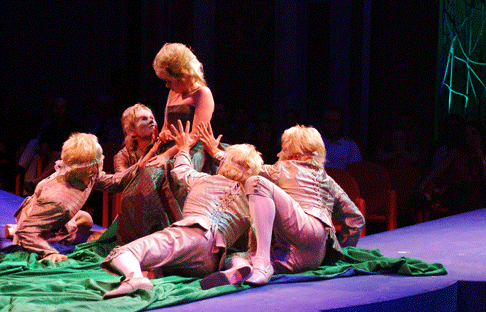21 Jun 2009
Claudio Abbado Introduces the Complete Pergolesi
Very little is known about Giovanni Battista Draghi (or Drago, according to certain sources), known as Pergolesi.

Very little is known about Giovanni Battista Draghi (or Drago, according to certain sources), known as Pergolesi.
He was born in Jesi — also the birthplace of Gaspare Spontini — on January 4th 1710 to a poor family (and most likely affected by many hereditary diseases). At a young age he left the small and pleasant little town on the Marche hills near the Adriatic Coast to move to Naples. There he studied at the San Pietro in Majella Conservatory. Upon graduation, he found employment as a musician and composer with a family, the Maddaloni, closely linked to the Austrians and thus not on good terms with the new powers-to-be in Naples (the Spaniards). He died young , at the age of 26, in a Monastery near Pozzuoli, in the suburbs of Naples. In his short life, he composed several opera serias, Church music and intermezzos. He was, it seems, well-known and appreciated in Naples and Rome (where the Maddaloni family went to find shelter when the Spanish Bourbons took over the Government in the Southern State).
He became internationally known several years after his premature death when his intermezzo La Serva Padrona, generally credited as the first opera buffa, precipitated a major artistic controversy (la Guerre des Bouffons) in France as well as elsewhere in Europe in the decades immediately preceding the Revolution. The first performance of La Serva Padrona in Naples in 1733 passed unnoticed; it was performed as a intermeszzo among the three acts of the opera seria Il Prigionier Superbo. La Serva Padrona was produced in Graz in 1739 by an Italian touring company without much notice. Its big splash was in Paris in 1752. Then, it provoked such a tumult of enthusiasm that it can be said to have caused a revolution in French opera; it played to almost full houses for nearly three years. At that time, French opera dominated and domineered European stage. The plot of La Serva Padrona is simple and satiric. Most of the dialogue is written the rapid recitative secco , unknown elsewhere in Europe except for Naples. The real charm of the short two parts intermezzo resides in the set numbers arias and duets where comedy and pathos intermingle. It was a real shock in Paris where the baroque opera was at its sunset and the tragédie lyrique was losing his hold. La Serva Padrona became an opportunity to inveigh against tradition and to promote the new culture of free expression of feelings- in short, to bring enlightenment to the opera stage and to the opera houses. The philosopher Jacques Rousseau became the leader of the movement; he himself composed an opera buffa in the new style, Le Diven du Village.
 A scene from La Serva Padrona
A scene from La Serva Padrona
Internationally, Pergolesi is mostly known for La Serva Padrona and two of his sacred pieces, Salve Regina and Stabat Mater, but he was a prolific composer in his brief life; at least six operas, mostly opera serias, are attributed to him. For the 300th anniversary of his birth, the Jesi-based Pergolesi Foundation has the ambitious program to stage all of them; the six operas will be staged in Pozzuoli, where, as already mentioned, the composer died.
It is fair to say that only two of the six operas would be new productions. In the last few years, the Foundation has already staged four of them in programs co-produced with the Festival of Radio France in Montpellier and with the Baroque Festival of Beaune as well as with the theaters of Modena, Piacenza, Ravenna, Reggio Emilia and Treviso. The full schedule is available at www.fondazionepergolesispontini.com and summarized at the end of this article.
 A scene from L’Olimpiade
A scene from L’Olimpiade
A jump start to the festival was, on June 5th, a concert of the Mozart Orchestra with Claudio Abbado conducting a fine group of soloists and the Swiss Radio Chorus. The concert was performed in the lovely Pergolesi Theatre in Jesi, with live and free maxi-screen video on the main square of the town. Only the initial number of the concert came from an opera, the aria Manca la guida al piè from the Neapolitan music drama Li Prodigi della Divina Grazia nella Conversione e Morte di San Guglielmo, a dramatic play Pergolesi composed when he was 21. The play has never been staged in modern time; it is programmed for December 2010 as a part of the performances of Pergolesi’s complete oeuvre. The rest of the concert was devoted to Church music with the Missa in F major taking up the entire second part. Abbado conducted with sublime elegance. All the soloists were of high standard, especially the alto Sara Mingardo. The audience was enthusiastic.
Our readers are most likely more interested in the operatic full immersion in Jesi and Pozzuoli than in a review of concert. I have seen in Jesi all the four productions that will be revived as a part of 2010 program. All of them are of high quality and show a Pergolesi very different than the composer generally known to international audience - mostly through La Serva Padrona, Salve Regina and Stabat Mater. I would recommend especially two of the four operas: La Salustia and L’Olimpiade. The former is one of the early opera seria by Pergolesi: it is passionate, nearly lascivious (also due to the staging by Jean-Paul Scarpitta), and thus very modern as compared to the standard and style of the time. The latter uses the Metastasio libretto previously set to music by Vivaldi, Galuppi and others, but it is unusually powerful in capturing friendship and competition among two young men; the staging of Italo Nunziata is a dramatic masterpiece.
Giuseppe Pennisi
The Opera performances in Jesi:
Il Prigionier Superbo- 11-12 September 2009 La Serva Padrona - 11- 12 September 2009 Il Flaminio - 4-6 June 2010 Adriano in Siria - 10’-12 June 2010 Livetta and Tracollo - 10-12 June 2010 La Fenice sul Rogo - 13 June 2010 Lo Frate ‘Nnamoratu 3-5 September 2010 L’Olimpiade - 10-12 Sempter 2010 Li Prodigi de la Divina Grazia 11September 2010 Il Prigionier Superbo 19-21 November 2010 La Serva Padrona 19-21 September 2010 La Salustia 10- 12 December 2010
Dates of the Opera Performance in Pozzuoli 4-13 September 2010